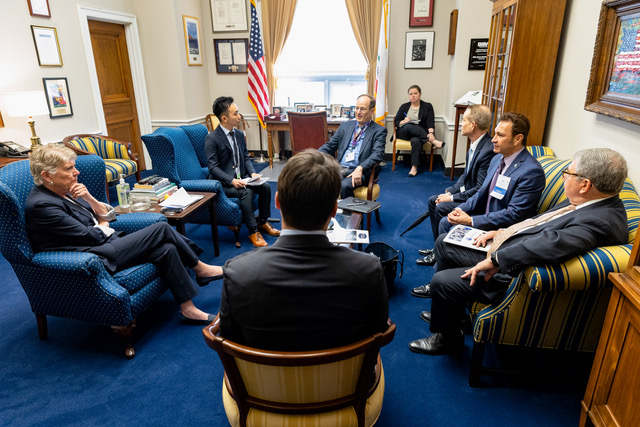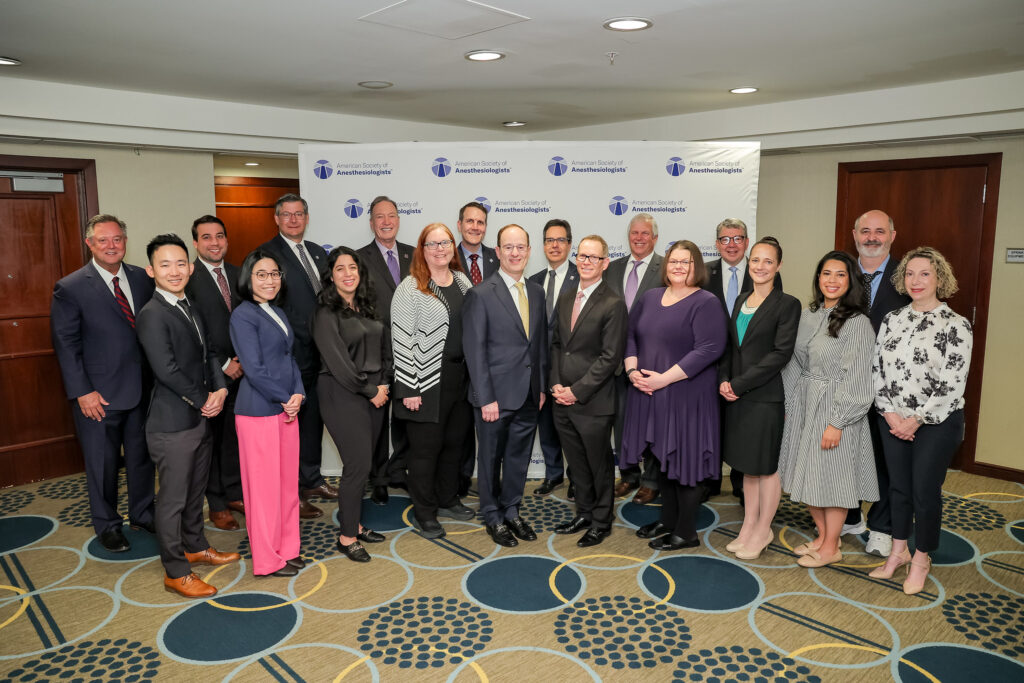By Christine Doyle, MD, CHCI, FASA – ASA Director and Antonio Hernandez Conte, MD. MBA, FASA – CSA President
On May 14th, twenty members of the CSA (including 4 residents) started a three-day marathon at the annual ASA D.C. Legislative Conference. Each of the attendees visited multiple offices with our first meetings on Monday morning before the conference had officially started.

We visited a total of 32 California legislators’ offices, meeting with staff and U.S. Representatives from across the state. Dr. Conte also took to the main stage to introduce Congressman Mark Takano on Tuesday. During our visits, we focused on a few key issues: physician workforce, payers (both private and government), VA care standards, and naloxone access. We have several bills that we are following, and you can track at the status of each of them by searching on the congress.gov website using the bill number. If *your* representative is already supporting (a co-sponsor), send them a thank you note. If they aren’t, consider reaching out to the office to ask them to support the bill.
Physician Workforce:
Three Congressional bills specific to workforce issues are being supported by the ASA. The first is H.R.2389/S1302, the Resident Physician Shortage Reduction Act, which would provide direct GME (government) funding for an additional 14,000 residency positions in all specialties across the country. The second is H.R.1202/S704, the Resident Education Deferred Interest (REDI) Act, which would allow borrowers to continue to defer payment of loans while in residency, but more importantly would defer interest accrual during residency as well (which can significantly increase the amount of a money owed over the course of training). The third is H.R.2761/S705, the Specialty Physicians Advancing Rural Care (SPARC) Act, which would authorize a loan repayment program to encourage specialists to serve in rural communities who otherwise would not have any local access.
Payors:
The continued consolidation and vertical integration of private insurance companies has led to “unchecked behavior,” with resultant nefarious methods to deny care to patients and/or delay payment to healthcare practitioners. While this is not limited to anesthesiologists, we are particularly at risk. Our CSA delegations discussed continuing problems associated with the massive cyberattack on Change Healthcare and their parent organization United Health Group, including the secondary effects starting to be seen as claims are denied because they are “stale” (after the normal filing deadline) because they weren’t processed by Change.
United Health CEO Testimony before Senate and House:
Additional insurance schemes (i.e. scams) being discussed include third parties who get a “shared savings” (i.e., get paid more) if they deny payments, announced arbitrary removal of physical status modifiers (ASA III-VI), and ongoing issues with the Independent Dispute Resolution Process (IDRP) created as part of the No Surprises Act (NSA). Changes have been made to the national IDRP, and physicians are winning well over 3/4 of all disputes, however, payments have been issued in less than half of all of these cases.
There are no current bills in either House or Senate, but ASA and the house of medicine as a whole are working with legislators to create a proposal. Additionally, there are still two outstanding lawsuits brought forth by the Texas Medical Association that seeks remedies to the NSA.
With regards to Medicare, there are two bills dealing with the ongoing problems impacting all physicians. While neither bill is specific to anesthesiology, both will help significantly to increase reimbursement. The first is H.R.2474, the Strengthening Medicare for Patients and Providers Act, which would add a mandatory annual inflation update, exactly the same as all of the other groups (hospitals, ASCs, etc). Second is H.R.6371, the Provider Reimbursement Stability Act, which would increase the threshold for budget-neutrality and set limits on conversion factor variance. The original budget neutrality mandate was included in the Omnibus Budget Reconciliation Act of 1989, which mandated any increases of $20M or more must be offset by cuts elsewhere. Currently, there is no allocated physician reimbursement increase linked to inflation or anything else. This has put multiple specialties in a no-win situation, because if we increase payments for one group, we have to decrease it for another group. The AMA has been very active on this topic, as have other specialty organizations; this remains an ongoing major battle.
VA Care Standards:
ASA and its members continue to advocate for a single standard of care across all facilities, which includes the VA. Proposals to decrease that standard by removing team-based care have again been proposed, and ASA has mounted a strong opposition. As we all know, the very conditions that render a Veteran eligible for PACT Act benefits heighten their risks for anesthesia and surgery. H.R.3347/S.B.2070, the Protect Lifesaving Anesthesia Care for Veterans Act is in play and may possible be added into a broader bill dealing with additional Veterans issues. At this point, we are asking legislators to sign on to a letter co-authored by Reps David Scott (GA), Mike Turner (OH), and Andrew Garbarino (NY), which urges the Department of Veterans Affairs to immediate halt any initiative to weaken or dismantle the anesthesia care team. This letter is open until June 7th, at which point it will be sent.

Naloxone Access:
ASA and CSA continue to educate legislators about the differences between medical-use fentanyl versus illicit fentanyl. In 2023, ASA and others encouraged the FDA to make naloxone available over-the-counter, without prescription. FDA made that decision in March, 2023. Continuing on this path, there are 3 related bills to continue to make naloxone broadly available. The bills are H.R.5625, the Fentanyl Awareness for Children and Teens in Schools (FACTS) Act, H.R.5420/S.2948, the Workplace Overdose Reversal Kits (WORK) to Save Lives Act, and H.R.6161, the Supporting Access to Vital and Affordable Care for Everyone (SAVE) Act.
We would like to thank Drs. Eugenia Ayrian, Elizabeth Behringer, Patrick Farmer, Vanessa Henke, Phillip Levin, Christina Menor, Jeff Poage, Johnathan Pregler, Todd Primack, Myriam Sarwary, Mark Thoma, Paul Yost, Mark Zakowski, and special guest ASA Past President Mike Champeau. We would especially like to thank our residents who attended: Drs. Joana Abed Elahad (USC), Samantha Cheng (Loma Linda), Steven Heer (Cedars-Sinai), Jason Hsieh (USC).
